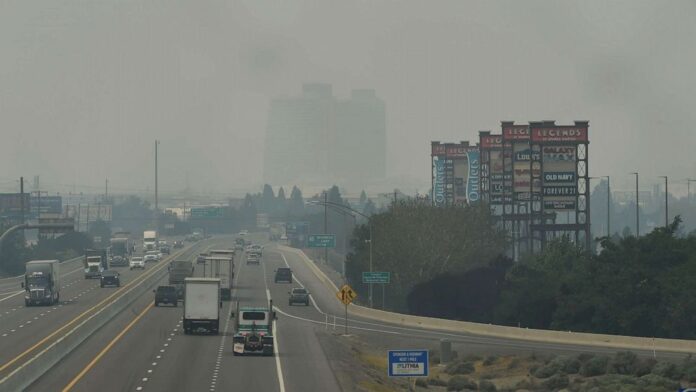
As a result of the California wildfires in early 2020, air quality in Nevada has fluctuated, exacerbating a pre-existing problem. While flames raged across California in August and September last year, satellite images revealed smoke spreading into parts of Nevada, notably near Reno, Carson City, Minden and Gardnerville.
According to the Nevada Independent, Las Vegas experienced 14 days of poor air quality in 2020, which was most likely due to the wildfires. More recently, in 2021, according to the study conducted by The American Lung Association, Las Vegas and Reno are among the top 25 cities most contaminated by short-term pollutants. Nevada’s air quality must be addressed immediately to protect the health of Nevada residents.
Compared to the 2020 study, a recent assessment stated that Las Vegas suffered fewer harmful days of high ozone this year. Still, it remains the 12th most polluted city. The same report states that pollution in Nevada jeopardized the health of approximately three million inhabitants, particularly those who are vulnerable to the impacts of air pollution, such as older adults, children and people with lung illnesses.
Additionally, another major concern in Nevada is rising temperatures, which are heightened by ongoing pollution and wildfires. KTNV, a local news channel, stated that the summer average temperature in Las Vegas has risen by 5.6 degrees, making it one of the fastest-warming cities in the United States.
The rise in temperatures adds to the worsening air quality, as well as fossil fuel emission, which is the release of harmful greenhouse gases like carbon dioxide from factories and vehicles. This in turn damages the ozone layer, which causes air pollution and provides less protection from harmful substances that could affect people’s health.
The situation in Nevada appears bleak. However, UNLV professor Lung-Wen Antony Chen, who has been studying air quality in Las Vegas for the last six years, is hopeful that the state’s poor air quality can be reversed or controlled.
Chen and his team at the UNLV Urban Quality Laboratory conducted a study where they distributed portable sensors to students at Spring Valley High School in November 2019 to measure the amount of polluted air they were breathing. This was done in an attempt to raise awareness about the importance of clean air and encourage communities to contribute to the preservation of clean air.
Although the results have shown the air quality to be consistent in general, there have still been some fluctuations.
Studies and research like Chen’s must be conducted more regularly and on a larger scale to develop remedies for air pollution. Neglecting such a critical challenge will only make matters escalate and spiral out of control.
Even though air quality and climate concerns have been prominent issues recently, most countries have failed to address this problem. If climate concerns remain neglected, the future health and welfare of people all around the world will be threatened, seeing as air is an essential need for human survival.
Wildfires, rising consumerism, pollution and global warming all contribute to deteriorating air quality across the world, not just in Nevada. A lack of clean, high-quality air leads to poor health and the development of respiratory diseases, which should encourage every country, state and county to take action to prevent further degradation.
